| Reviews & Columns |
|
Reviews DVD TV on DVD Blu-ray 4K UHD International DVDs In Theaters Reviews by Studio Video Games Features Collector Series DVDs Easter Egg Database Interviews DVD Talk Radio Feature Articles Columns Anime Talk DVD Savant Horror DVDs The M.O.D. Squad Art House HD Talk Silent DVD
|
DVD Talk Forum |
|
|
| Resources |
|
DVD Price Search Customer Service #'s RCE Info Links |
|
Columns
|
|
|
In the House
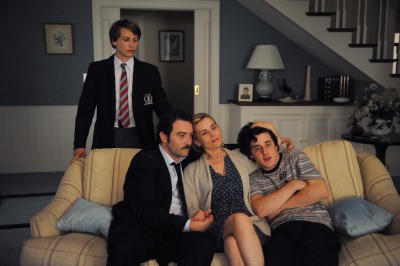
Please Note: The images used here are from promotional material provided by The Cohen Media Group and are not taken from the Blu-ray edition under review.
I'm prepared to accept that smart, crowd-pleasing French filmmaker François Ozon (8 Women, Swimming Pool), whose work I've often enjoyed and appreciated, is middlebrow, a skilled and intelligent writer/director whose ambitions usually reveal themselves to be too comfortable and easily attainable to let his work get to the next level. But having just taken in his latest confection, In the House, I still cling to the idea that, old-fashioned and conventional as his sometimes superficially "daring" pictures are, he escapes the obvious trap of mediocrity. Like his predecessor in French Hitchcock-philia, Claude Chabrol (La Cérémonie, A Girl Cut in Two), Ozon nearly always manages to put a sting in the tail of his simultaneously bourgeoisie-repelled and bourgeoisie-obsessed films, so that what might strike a viewer at first blush as glib or complacent has an oddly lingering, disturbing effect. Aside from the stark, quiet, and deeply affecting Under the Sand -- probably his best offering to date -- Ozon's films seem to bear a certain slickness, but there's a stealthy, surprisingly hard intelligence lurking in their wings, so that the pictures, when they work, become almost accidentally tougher and deeper than they initially seem.
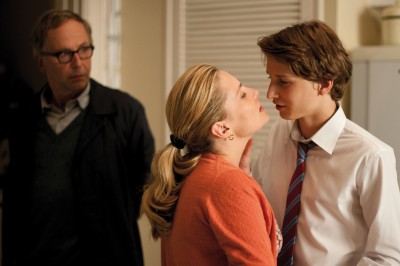
This newest effort revisits territory Ozon previously explored, probably with somewhat more focus and incisiveness, in Swimming Pool -- the uneasy-verging-on-destructive intermigling of fiction and reality in the lives of frustrated storytellers and sophisticated creative types. Germain (Fabrice Luchini) is a taciturn, perpetually bemused high-school literature professor who's long since given up his unrealistic dream of doing what his great loves -- Flaubert, Dostoyevsky, Dickens -- did as great novelists, settling instead into a life of low-key contempt for his students, hopelessly uninterested in literature, and for himself, another grumpy old man with unfulfilled aspirations. Germain and his wife, Jeanne (Kristin Scott Thomas), a gallery curator whose high-minded love of the contemporary visual/plastic arts is smudged under the thumb of her philistine, profit-seeking bosses, is in a similar dissatisfied state. These two affluent midlifers, "successful" enough but too aware of what great creative achievement is to get over their own comparative mediocrity, are classic bourgeois bohemians, paralyzed by self-consciousness, cultivation, and the cruel realities of what bland uses their gifts have to be turned to in order to pay the mortgage and keep buying too many books.
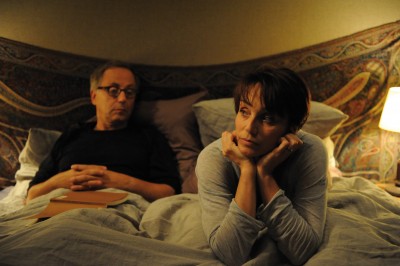
It looks like it's going to be the same story this school year for Gervais -- an almost comically indifferent, burnt-out counterpoint to the hopeful and engaged high-school-teacher toughing out the decaying French educational system played by François Bégaudeau in Laurence Cantet's much more realist and socially-engaged The Class -- but when his new, quiet but bright pupil Claude (Ernst Umhauer) begins fulfilling his written assignments by submitting talentedly-written tales from the lives of a very normal, average, mundane classmate, Rapha (Bastien Ughetto) and his affable, kind, dim parents (Inglourious Basterds's Denis Ménochet and The Diving Bell and the Butterfly's Emmanuelle Seigner), Gervais shares the privacy-violating, rather cruelly-toned, masterful descriptions of Rapha's family's glaringly unexamined middle-class lives with his wife, and the two are hooked by the reckless literary talent and sadistic voyeurism Claude grants them from his inside view after ingratiating and integrating himself into the banal pleasantries and frustrations of this family, which is entirely untroubled by the kinds of educated-intellectual self-flagellations to which Gervais and Jeanne reflexively subject themselves. Gervais's encouragement and mentoring of Claude slowly but surely becomes a codependent vortex of projection (of his own ambition), unhealthy curiosity, ethical compromise, and casual exploitation of the hapless basketball-loving boy and dad with their home improvement-obsessed wife/mom whose blissful ignorance provides the raw material for the increasingly dangerous game the transfixed professor and his gifted pet are playing as they grind reality into fiction/"art," a messier and bloodier process than either of them bargained for, yet one they seem helplessly impelled to continue.
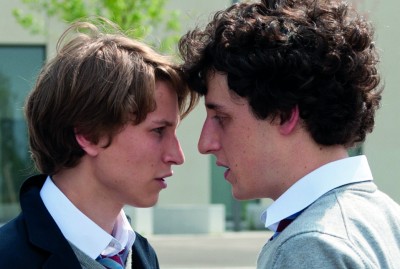
In the House probably isn't quite as probing and profound as it thinks it is, and Ozon once again indulges the penchant for flatly straightforward, sincere cutesiness that infested too much of his last film, Potiche. But there's enough sharpness to his observations of the tensions between the solipsistic, tangled-up would-be literati and the contented, unpretentiously quotidian life at which they look askance, and most of all the perversities built into the eternal human need to make messy, difficult life into an interesting "story" (there's a beautifully conceived and shot moment, with Gervais and Jeanne at a cinema, that leans just enough, but not too hard, into the idea that we, the viewers, are deeply implicated in this conundrum, too), that this movie's unfortunate, thankfully only intermittent tendency to aesthetic slickness , along with its finally too piled-on and inconsequential quasi-Bunuelian POV shifts and blurrings, can't fully muddle the calm, creepy realist lucidity (the Chabrol trademark). That poker-faced clarity is greatly supported by cinematographer Javier Almera's cool but bright lighting and Ozon's restrained, precise framings of art director Arnaud de Moleran's institutional lycée rooms/hallways and placidly well-appointed living spaces, rendering In the House more involving and affecting than it would seem to have a right to be. It's not a horror or suspense film, exactly, but it's nightmarish; we recognize something alarming in it, something hidden, the specific malevolence of which we can't quite put our finger on. Upon deciphering it, it becomes clear that the latent content of this twisted dream is nothing less than the eternally enticing and problematic (and, for good or ill, absolutely unavoidable) story-fication of life that human beings tend, probably universally, to engage in, its pleasures and problems intertwined and blended into a delightful poison. "People need stories," Gervais informs the eager-to-please, impressionable Claude. "Life would be nothing without them." But is life with them more than "nothing," or something somehow less, or worse? This question haunts In the House, and despite the film's weaknessess and soft-headed spots, it poses it seductively and insidiously enough that it leaves us haunted, too.
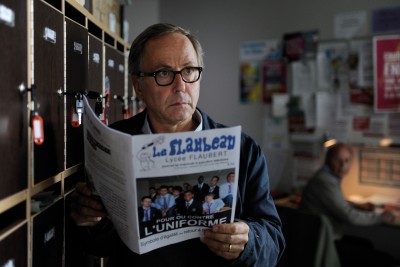
Video:
The transfer of the film -- presented at its original widescreen theatrical aspect ratio of 1.85:1 -- is almost perfect: The cool yet richly and brightly colored results of DP Jerome Almera's lighting come through very nicely, with excellent skin tones and solid darks throughout. I noticed one very brief instance of what appeared to be aliasing or some sort of slightly, momentarily distorting visual noise, but it's only once and very minor; otherwise, the picture quality is uniformly, conscientiously high, and the celluloid-like texture of the artfully shot-on-film images is robust and natural.
Sound:This Blu-ray edition of In the House offers either DTS-HD Master Audio or Dolby Digital 5.1 surround tracks (in French with optional English subtitles). Both sound great, but the DTS is the way to go if it's available on your setup; the spectrum of sound, from all the layers in Philippe Rombi's alternatingly taunting and melancholy score to the immediate, full, and clear dialogue are all superb, without a trace of distortion or imbalance.
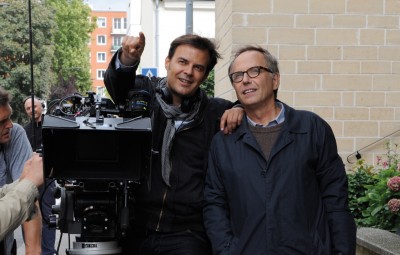
--A making-of featurette the ample length (54 min.) of which gives us remarkably intimate access to many different shooting days and parts of the process, from technical prep to intense on-set creations of scenes with director, crew, and performers.
--About 12 minutes' worth of deleted scenes, with a prefatory note from Ozon indicating, accurately, that the scenes were not deleted because they were bad, but because they seemed redundant or overexpository.
--A blooper reel (11 min.) that's not quite as mirthful as many; here, it's mostly actors flubbing their lines or getting the giggles with the understandably time- and budget-conscious Ozon politely but firmly directing them back into line from off-camera.
--A montage of clips from preparatory costume fittings/screen tests.
--"Premiere at the Rex,", footage from after a test screening held for 2,500 high-school teachers, with a Q&A from the stage with director and principal cast, and a flurry of candid evaluations from the attendees as they exit.
--A poster gallery/slideshow that appears to compile all designs, whether just considered or actually used, from the film's promotional campaign.
--The film's U.S. theatrical trailer along with several other previews for Cohen Media Group releases.
--A booklet featuring photos, credits, and a director filmography.
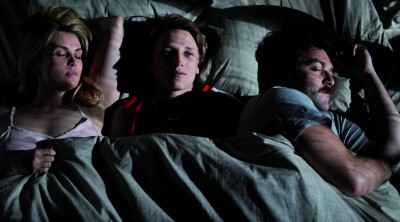
There's something deliciously yet fleetingly smart about In the House, which at its best points to director François Ozon -- not the first-rate filmmaker he once promised to be, but a reliable creator of actually elegant, actually inspired pastiches -- as a successor to the late, often great Claude Chabrol's obsession with the calm nihilism he saw permeating bourgeois existence. It's essentially a story of painfully self-aware timidity on the part of a middle-aged couple -- a high-school literature professor (Fabrice Luchini), who once tried and failed to be a great novelist, and his wife (Kristin Scott Thomas), an art-infatuated gallery minion resentful of her own enforced, crass careerism -- and how it's blown apart by the troubling, enticing stories one of those high-school students (Ernst Umhauer) spins for them under the increasingly over-invested mentorship of his usually impeccably reserved teacher. Despite the film's occasional excess of slickness in style and a few too many goofy stabs at quasi-Bunuelian incongruity that seem more and less "clever," in the wrong ways, than necessary, it does manage to have something provocative to say about storytelling, the at once warped, dangerous, and irresistible bond between fiction and reality. Ozon seems highly attuned to the troubling nature of how we need stories and how stories, parasitically, need us -- the vulnerabilities, fears, foibles, and failures that make life painful and are the indispensable ingredient in any kind of dramatic fiction, including films like this one -- and that sound wisdom outlives the film's flimsier moments. In the House has a sharp buzz that vibrates right through its weaknesses and leaves you tingling with a mix of gratification and disturbance of which Chabrol or even Hitchcock -- the ultimate master of this sort of troubling entertainment -- would've been proud. Recommended.
|
| Popular Reviews |
| Sponsored Links |
|
|
| Sponsored Links |
|
|
| Release List | Reviews | Shop | Newsletter | Forum | DVD Giveaways | Blu-Ray | Advertise |
|
Copyright 2024 DVDTalk.com All Rights Reserved. Legal Info, Privacy Policy, Terms of Use,
Manage Preferences,
Your Privacy Choices | |||||||













